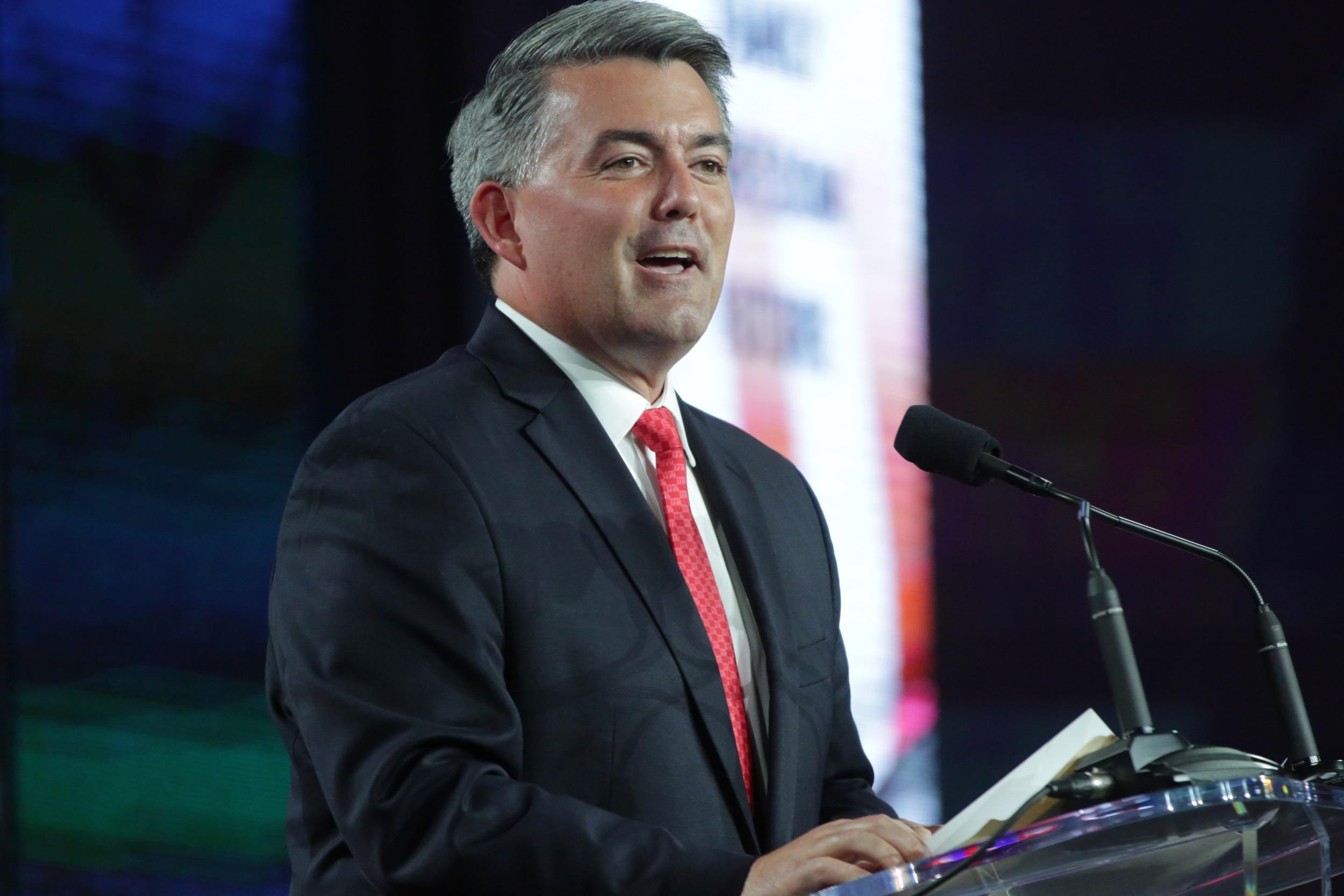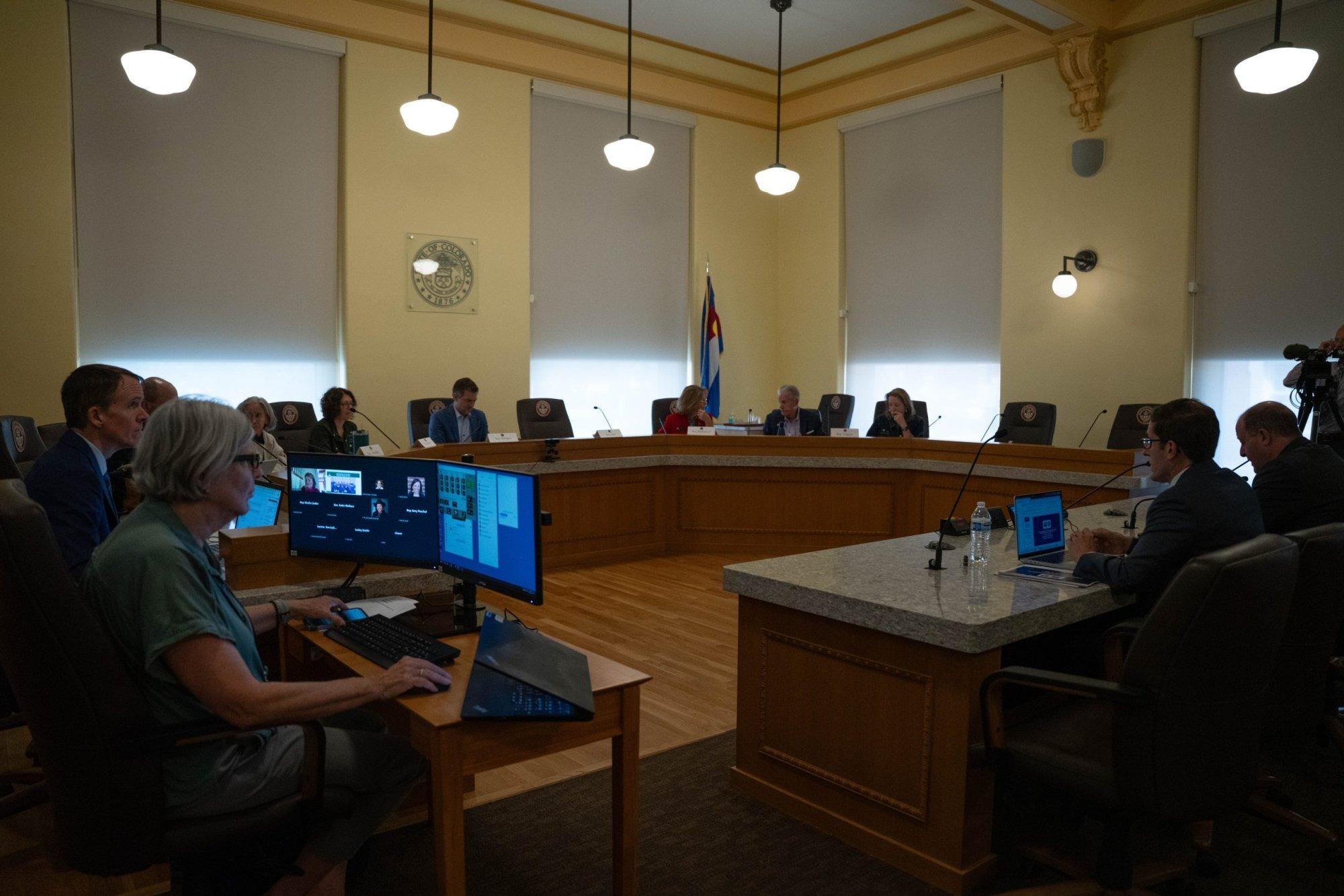
Republican U.S. Sen. Cory Gardner declined Wednesday to say whether he supports or opposes President Donald Trump’s latest attempt to dismantle the Affordable Care Act.
Gardner spoke to CPR’s Colorado Matters the day after voters in a Democratic primary selected the opponent he’ll face in November. The choice will be between Gardner and former Gov. John Hickenlooper, and health care has already emerged as a key issue between them.
The Trump administration recently filed a brief with the U.S. Supreme Court seeking to have the ACA overturned.
In the interview, Gardner was repeatedly pressed to answer “yes or no” to whether he backed the administration’s request.
Gardner first said that both Democrats and Republicans want to “reverse” the ACA.
“What we need to do is find Republicans and Democrats who are willing to find a better solution to the Affordable Care Act,” he said.
Asked again, he said Democrats, including Hickenlooper, back “socialized” health care.
Gardner said he wanted to work on reforms including protection for people with preexisting conditions, purchase of health insurance across state lines, and the use of risk pools to reduce insurance costs.
He has voted in favor of ACA repeal in the Senate and supports that step on his senate website. Hickenlooper has said he wants to build on the Affordable Care Act with a public option that he claims would lower costs, attract new buyers and ultimately lead to universal coverage. Hickenlooper had to fend off a challenge from his left in the primary by Andrew Romanoff who was in support of “Medicare For All.”
In conversations with Colorado voters, CPR News has found a range of views, positive and negative, on Obamacare — although the issue is now somewhat overshadowed not only by the pandemic but recent protests.
Gardner also addressed another recent Trump administration controversy: U.S. intelligence reports that Russia offered bounties on the lives of American and coalition troops in Afghanistan. The New York Times reported that Trump was briefed on the intelligence in February.
Asked whether Trump should retaliate against Russia, Gardner said, “I think we should always go after people, whether it’s Russia or anyone else, who is trying to attack U.S. soldiers or interests.” He noted he previously introduced legislation to declare Russia a state sponsor of terrorism.
The upcoming campaign between Gardner and Hickenlooper will be one of the most closely watched in the nation. The Republican incumbent has long been thought of as a vulnerable candidate, in part because of Trump’s general unpopularity in Colorado, and Democrats are eager to exploit that perceived opening in their fight to regain control of the Senate.
Interview Highlights
On support for the Trump administration's request to the Supreme Court to dismantle the Affordable Care Act:
Cory Gardner: Well, I agree with the Democrats that the Affordable Care Act is not working, but I do not support universal health care.
Ryan Warner: What would you replace the Affordable Care Act with? Republicans have had many years to devise a plan, and voters have yet to see something specific.
CG: Well, I certainly wouldn't replace it with socialized medicine —
RW: What would you replace it with?
CG: ... which is what Joe Biden and John Hickenlooper want. What I look forward to working on is a plan that protects people with preexisting conditions, a plan that allows people to buy health insurance across state lines, that builds on the risk pools to drive down insurance, to build on the telemedicine work that we're doing, and many other reforms that can drive down the cost of care, increasing the quality of care. But I don't think socialized medicine is the right way to do it. In fact, Colorado voters resoundingly rejected universal health care just a couple of years ago.
RW: With Republicans in control of the Senate and Republicans in control of the White House, why hasn't an alternative healthcare plan specifically emerged yet?
CG: Well, I think we have a number of plans. In fact, one of our plans was shown that it would reduce healthcare costs by an analysis that Blue Cross Blue Shield put forward. I remember talking to Governor Hickenlooper about that plan. He actually said in a personal conversation with me that he liked that. So I think we didn't get a chance to get to vote on the plan that we would put in place.
On whether President Donald Trump should have reacted more quickly to U.S. intelligence about Russian bounties on U.S. troops:
“I think if you listen to the analysts, there’s a difference between analysis and collection and I’m not in on the presidential briefs.”
On complaints that Trump’s nominee to head the Bureau of Land Management, William Perry Pendley, has advocated for the sale of public land and derided climate activists:
“That’s exactly why we’re going to have a hearing and some very tough questions for Mr. Pendley … that’s exactly why we have a confirmation hearing with the process of investigation and checks, and that hearing will be provided.”
Read The Transcript
Ryan Warner: Colorado's U.S. Senate race is now set. Democratic and unaffiliated voters chose John Hickenlooper to face incumbent Republican Cory Gardner, and Senator Gardner is on the phone. Welcome back to the program.
Cory Gardner: Good morning. Thanks for having me.
RW: You sit on the Foreign Relations Committee, and so I'd like to start with Russian bounties on U.S. troops in Afghanistan. Senator, this intelligence was shared with the administration apparently in early 2019. Analysts believe these bounties resulted in the deaths of three Marines, and the intel eventually made it into the presidential daily brief, according to the AP. Should President Trump have acted on the information?
CG: Well, look, I think we should continue to act on information that is relevant to the safety of our men and women in uniform, whether they're in Afghanistan or anywhere around the globe. The Russian activities in Afghanistan are well known. In fact, in 2017, I published an op-ed in the New York Times talking about Russian interference and activities with the Taliban in Afghanistan. And as a result, introduced legislation to name Russia as state sponsor of terror. That bill has passed the Foreign Relations Committee, and it's awaiting final passage on the Senate floor, but it's a strong step I think we need to take to push back against Russian aggression.
RW: Specifically, on the question of the bounties though, should the President have retaliated against Russia to send a clear message about those particular payments?
CG: Well, I think we should always go after people, whether it's Russia or anyone else who is trying to attack U.S. soldiers or interests, and I think that's the same information I believe that Chuck Schumer and Nancy Pelosi had as well. It's why I've acted very swiftly and strongly on sanctions against Russia. It's why I've introduced legislation to pursue additional sanctions on Russia and also to name them a state sponsor of terror. So, Russia's activities deserve strong and certain retaliation, and that's why I've introduced this legislation.
RW: I do not hear you saying that the President should have acted earlier in this case.
CG: Well, I think if you listen to the analysts there's a difference between analysis and collection, and I'm not in the presidential briefs. I believe it's the same information that Chuck Schumer had and Nancy Pelosi had around the same time.
RW: Chuck Schumer and Nancy Pelosi are not the executives of the country. Do you have concerns that the President is not reading the daily briefs, as many outlets have reported?
CG: Well, look, I don't, again, you'd have to ask the President the question of whether he reads those daily briefs. Of course, the President needs to read the daily briefs. You'd have to ask him. I'm not the President obviously. And what I hope that we can continue to do is work together on legislation. My bill is bipartisan to name Russia a state sponsor of terror.
RW: Senator Gardner, tell me what your top priority would be if you get a second term.
CG: To continue to fight for the people of Colorado. We're going to need economic assistance and recovery to continue, to continue our work on the coronavirus pandemic, which we have put billions of dollars toward a vaccine. And I believe we'll have that toward the end of this year, if not sooner. And we need to continue making progress.
I'm going to continue to fight for every corner of the state. I'm not going to fire 250,000 energy workers like my opponent wants to do. I'm not going to have a massive tax increase like my opponent John Hickenlooper wants to do. I'm not going to pack the Supreme Court like John Hickenlooper wants to do. So, these are all things that I think are a key distinguishing feature between the work that I will do for the people of Colorado, as I have already done, by bringing the Bureau of Land Management to Colorado, opening up Space Command in Colorado, a passage of the most significant conservation bill in over 50 years, to fight for the state of Colorado.
RW: You mentioned economic assistance in the face of COVID-19. I'll say that 126,000 Americans have died of the disease, and the country's top disease expert says the U.S. could soon see 100,000 new cases per day. It's against that backdrop that several listeners, Senator, asked on Twitter about your many votes to dismantle the Affordable Care Act. Let me start with a yes or no. Do you support the administration's request before the Supreme Court to dismantle that law? Just again, yes or no, do you support that request?
CG: Well, RW, thanks for the question. What we have to recognize is both Democrats and Republicans —
RW: Yes or no?
CG: ... want to reverse the Affordable Care Act. Most Democrats and Republicans –
RW: Do you support the administration's request before the Supreme Court?
CG: ... want to reverse the Affordable Care Act. Even John Hickenlooper wants to reverse the Affordable Care Act because he supports socialized medicine. So what we need to do is find Republicans and Democrats who are willing to work together to find a better solution than the Affordable Care Act.
RW: John Hickenlooper wants to build on the Affordable Care Act. Do you support the administration's brief before the Supreme Court to dismantle it?
CG: John Hickenlooper supports socialized medicine and universal care —
RW: I'm asking if you support —
CG: ... and that's been reported by the Associated Press. So I don't think you can misinterpret John Hickenlooper's words when he clearly says, "I support socialized medicine." He wants to end the Affordable Care Act.
RW: I am very specifically asking you if you support dismantling the Affordable Care Act right now, the request before the Supreme Court.
CG: Well, I agree with the Democrats that the Affordable Care Act is not working, but I do not support universal healthcare.
RW: What would you replace the Affordable Care Act with? Republicans have had many years to devise a plan, and voters have yet to see something specific.
CG: Well, I certainly wouldn't replace it with socialized medicine —
RW: What would you replace it with?
CG: ... which is what Joe Biden and John Hickenlooper want. What I look forward to working on is a plan that protects people with preexisting conditions, a plan that allows people to buy health insurance across state lines, that builds on the risk pools to drive down insurance, to build on the telemedicine work that we're doing, and many other reforms that can drive down the cost of care, increasing the quality of care. But I don't think socialized medicine is the right way to do it. In fact, Colorado voters resoundingly rejected universal health care just a couple of years ago.
RW: With Republicans in control of the Senate and Republicans in control of the White House, why hasn't an alternative healthcare plan specifically emerged yet?
CG: Well, I think we have a number of plans. In fact, one of our plans was shown that it would reduce healthcare costs by an analysis that Blue Cross Blue Shield put forward. I remember talking to Governor Hickenlooper about that plan. He actually said in a personal conversation with me that he liked that. So I think we didn't get a chance to get to vote on the plan that we would put in place.
RW: Earlier this week, the President tweeted that you have his complete and total endorsement. Has anything about the President's handling of COVID-19 or of racial justice made you reassess your complete and total endorsement of him?
CG: Well, if your question is, am I going to support Joe Biden, I will not be supporting Joe Biden. I think this country in Colorado has benefited from the work that we have continued to do, and we can always improve. Absolutely, we can always do better, and we must do better. And so I look forward to this election or the President will win this election. I look forward to any election based on the solutions I have been able to achieve for the state of Colorado and mentioned some of them already, but I don't think this sort of movement towards socialized medicine, banning oil and gas, destroying jobs and economy in Colorado is the right thing. And if you look at just a year ago, when John Hickenlooper said he'd make a lousy senator, he spent the last six months proving himself right.
RW: You mentioned economic assistance in the face of COVID-19 and the economic crisis that has followed, is that as specifically economic assistance, do you see another stimulus coming?
CG: That's certainly going to be part of the debate. I think it's incredibly important that the American people who lost their jobs, 47 million people have made claims through uninsurance, that they're going to be okay, that they know they're going to be able to put food on the table, that they know that they're going to be able to meet rent and their mortgage payments. In Colorado, the unemployment rate is about 10.2 percent, it's less than they thought it would be at this point, but still far, far, far too high. That's why I was very, very supportive of the small business assistance programs that we put together, giving billions of dollars to Colorado businesses to hire and rehire people to keep small businesses' doors open.
CG: That's why I'm going to continue to work with hotels and restaurants, to do everything we can to get Colorado's economy on track, our tourism economy on track. And it's why I passed the Great American Outdoors Act, which is estimated to create over 100,000 jobs, thousands of which will be in some of Colorado's hardest-hit communities. And so, we have to consider it all, and we have to act, act very quickly on making sure that Coloradans get back on their feet.
RW: Last question, Senator, I know you have to go. William Perry Pendley has been nominated to lead the Bureau of Land Management, now headquartered in Grand Junction. You were instrumental in getting that national office to Colorado. Pendley used to advocate for the selling of public land. He has called climate activists kooks, he's been dismissive of Black Lives Matter. Should those be disqualifying when it comes to him getting the job permanently at BLM?
CG: Well, that's exactly why we're going to have a hearing and some very tough questions for Mr. Pendley. I was excited that we had bipartisan support from John Hickenlooper, from Governor Polis, from Senator Bennett for moving the headquarters of Bureau of Land Management to Colorado so that we can be closer to the leadership there, but that's exactly why we have a confirmation hearing with the process, investigation and checks and the hearing that will be provided
RW: I would expect tough questions in a hearing, but those are not disqualifying, you're saying, those aspects of his background?
CG: Well, we haven't even had the hearing yet. So, I look forward to this investigative process.
RW: Senator, thank you for being with us.









